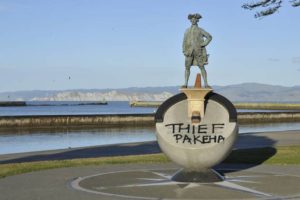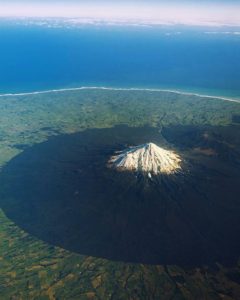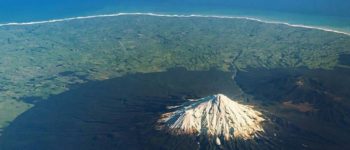1985: Placing Mt Egmont in the Shade
August 5, 2020
By AHNZ
Mt Egmont (discovered 1770¹) was given a new bilingual name by the New Zealand Geographic Board on August 6th, 1985.
It wasn’t popular with all Taranaki locals, but The State decided a combination name was best for the mountain. From 29 May 1986 the peak would be ‘Mount Taranaki’ and ‘Mt Egmont’ on the books.
As usual, this linguistic miscegenation was not the end but just the softening-up stage to eliminate the original name entirely. Because, yes, you guessed it, at the end of 2019, they flipped it again.
Both of the old names are now out and Taranaki Maunga will be the single and only name. Government schools and tourist publications etc. have doubtless already started drilling this into the population in an act of compelled speech,-
“After more than 30 years with two names, Taranaki’s most prominent landmark is about to have only one…..the names Mt Egmont and Egmont National Park will be consigned to the scrap heap.”- Egmont out, Taranaki Maunga in: agreement reached on mountain name change; Stuff (Dec 2019)
 Comment: “The people who don’t like it can continue to call it Mount Taranaki which is the English translation and nobody should be offended by it.”
Comment: “The people who don’t like it can continue to call it Mount Taranaki which is the English translation and nobody should be offended by it.”
Yes, people can still use their own name like Mt Egmont or Mt Taranaki but only in private or in secret. The State has mandated that the new monocultural title supplant the old. State TV and radio and schools and signs/maps etc will put their weight behind the prescribed speech. Soon, if not right now, this informal offer to tolerate former ways will be mocked (eg by talkback hosts) and bred out of New Zealanders completely.
The name has become a political symbol. Should have left it up to the local people to find their own meaning not do an Orwellian job on it from the top. Yet, as the Orwellian Priests say in their own texts, that’s exactly the agenda…
“The project of dismantling colonialism also requires that a new vocabulary be deployed…’to reclaim, rename, and reinhabit the land’. This concern with language and naming signals an important element in the process of decolonisation and in constructing the markers of a post-colonialism.”
“‘In both literature and politics, the post-colonial drive towards identity centres around language. For the post-colonial to speak or write in imperial tongues is to call forth a problem of identity, to be thrown into mimicry and ambivalence.”
“This can be seen in the way that the physical landscape has been identified and organised—the way in which European settlers have constructed maps as part of a process of colonisation”- Recalling Aotearoa; Augie Fleras and Paul Spoonley (1999)
 As the above passage shows, the Victimhood Culture New Zealanders are quite aware of the Culture War. They are actively colonising and take funding and support from The State to do it. They have book deals, gala dinners, lecture halls and tuxedos. Establishing hegemony over words and physical space is a huge win for them, as is toppling statues and changing Egmont to Taranaki Maunga. They know what they are doing, have been doing it persistently for decades, and are well-funded to do so. Not only is there no resistance (eg Where but AHNZ can you read a post like this one?) but those who would resist don’t even know they’re in a culture war.
As the above passage shows, the Victimhood Culture New Zealanders are quite aware of the Culture War. They are actively colonising and take funding and support from The State to do it. They have book deals, gala dinners, lecture halls and tuxedos. Establishing hegemony over words and physical space is a huge win for them, as is toppling statues and changing Egmont to Taranaki Maunga. They know what they are doing, have been doing it persistently for decades, and are well-funded to do so. Not only is there no resistance (eg Where but AHNZ can you read a post like this one?) but those who would resist don’t even know they’re in a culture war.
“This month, June 2020, Hamilton City Council famously tore out tore out the statue of the man their city was named after, Captain John Hamilton. They did this because they understood that the temporary flare up of Black Lives Matter protestors had the agenda of vandalising the statue themselves…Hamilton’s politicians quickly followed this act up by paying mainstream historian Vincent O’Malley (left) $10,000 to character assassinate independently report on 4 targeted figures in New Zealand history.”- Historical Report on Hamilton Street and City Names
Comment: “I think any efforts to reinvigorate te reo (even those enforced by the state) are always positive because of our country’s disgusting history of colonialism and continued lasting effects lmao”

Two wrongs make a right? You’re advocating colonisalism when it’s the racial group you side with and opposing it when it’s the other race. That used to be known as Racialism but we call it something else now.
Comment: “nah I think reverse racism is a (ahem) white lie. maori people also can’t colonise new zealand because its ours.”
Notice how ‘perceived racism’ becomes a White Lie and ‘colonialism’ becomes Exercise of Property Rights depending on who is doing it to who? This is no more than an excuse for one people to abuse another.
As an Anarchist I’d prefer that the State stay out of religion, stay out of economics, and stay out language too. It’s no business of the Government what names you may or may not use when you think or talk.
—
1 Captain Cook named it Mount Egmont on 11 January 1770 after John Perceval, 2nd Earl of Egmont, a former First Lord of the Admiralty who had supported the concept of an oceanic search for Terra Australis Incognita.; Ref. Wiki
Ref. 2018: Government Place Names
Ref. Professor Paul Spoonley, the Human Magazine; A Professor Pivots, NZB3
Note: Comment: “Surely Taranaki was used first, before Egmont?”
No. There were no Maori in Britain or on Cook’s crew in 1770. When New Zealand became a start-up nation about 50 years later the original name for the mountain was Egmont.
The name ‘Mt Taranaki’ is something Maori immigrants brought with them to the new nation. There would have been other people before Maori with their own even older names too. If they had been around they could have migrated to New Zealand too. Had they done so, they would be coming to a country that already had its own originating culture and names.
3 thoughts on "1985: Placing Mt Egmont in the Shade"
Leave a Reply
 Like Comment Share
Like Comment Share







Mt Egmont by name. Always Mt e
Egmont
Excellent article Rick.